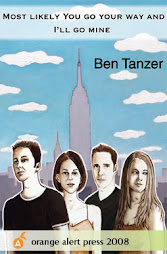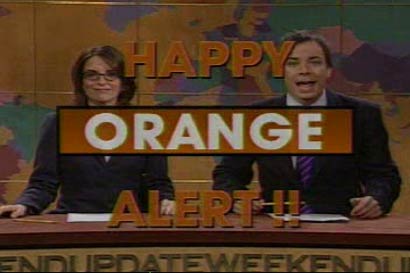
Jacob McArthur Mooney
"Any argument based on statics just paints the room a darker red. Squint and you could lose it in the darkness, mistake it for blood on the walls."
So you are sitting there with a collection of poems you have written over the last year or so, and you would love to see it turned into a book or chapbook. You may even have a clever title for your collection like, "Shattered Keystrokes" or "All the Pills in the Cupboard". You may have even distributed a few copies to friends, but why are the publishers, even the smallest ones, not taking the bait? A Nova Scotian, currently living in the States, Jacob McArthur Mooney was once told a piece of advice that allowed him to take his collection and turn it into a published and beautifully presented book. I'll let him tell the story, but his debut book The New Layman's Almanac, appears to give a nod to style of the traditional almanac on the surface. Yet, underneath lays a great collection thoughts and poems on all sorts of subjects including love, baseball, life, childhood, Canada, and so much more. In fact, I believe he may be the first poet to actually use Mark Mulder in a poem.
Jacob McArthur Mooney is the poetry editor for Thieves Jargon and the founder of The Facebook Review. Recently he was kind enough to answer a few of my questions.
Orange Alert (OA): The New Layman's Almanac is a great concept, and is very well designed. What came first the concept or the poems?
Jacob McArthur Mooney (JM): Er, thanks. And thanks also from the design team at McClelland & Stewart. The concept was dreamt up about halfway through the writing of the poems. I remember going out to dinner with a group that included a very successful older poet who, while offering a string of advice, threw out the generalization that no new poets could ever get published without having a thematic book, that no "pure collection" has a chance. All I had at the time was a "pure collection" of poems with disparate themes and styles. So, if you look closely, you'll see that TNLA is a very athematic book, with poems about everything. The structure of it is actually pretty cosmetic, if you ignore the titling conventions and the "see also" bits, you'll see there's not much holding it together. So what started as an in-joke between me and my friends about the shallowness of publishing trends became one of the manuscript's big marketing tools. I'm not sure if this makes it more or less funny as a joke.
OA: I received several looks and comment while reading this on the train, which is always good. Why is the layout sideways?
JM: It's pretty simple. Many of the lines are too long to be printed the other way, and I have a deep-set hatred for the "line-down and indent five spaces" trick usually used to solve that problem. I was lucky to meet up with a lot of people at M&S who were willing to do weird things with this project, and that's one of them.
OA: You are also the poetry editor for Thieves Jargon. What do you look for in a "Thieves Jargon" poem?
JM: I look for good. I used to try and find poems that I thought would fit the aesthetic of the site, poems that I thought our regulars would like. But that's hard to do. Now I just try and find poems I like, and if they regulars don't like it, they can be replaced.
OA: Do you read other on-line journals to get a feel for what they are doing or do you allow the work to carve it's path? Do you feel there is competition between journals?
JM: There probably should be more competition. Friendly competition, mind you. I read Zygote every now and then, also nth position and Jacket and a couple of others. I don't read 3AM or McSweeney's anymore. I think it's healthy to be jealous when you think any of the other outfits really hit one out of the park.
OA: You also run your own site called The Facebook Review. I really like the concept, but why facebook? What has the response been like?
JM: It came out of trying to post my own work on Facebook and being amazed at all of the seemingly random rules that the format applied to what I was doing, like how long a line could be, or how many spaces I could have for an indentation. I liked the idea of using those rules as a sort of in-house form, and trying to grow like a kind of mold overtop of them. In the end, the rules beat me. We kept getting our stuff erased by random bots or admins who cancelled our account for not be a "real person" but instead a sort of intangible object, with the given name "Review Publisher". I didn't kick up a fuss over it, as it's all part of the experiment. Like, how strange is it for a name-recognition software, something completely inanimate, intangible, and even abstract, to decide on the "humanity" represented by a bunch of words?
OA: What's next for Jacob McArthur Mooney?
JM: I'm finishing a second poetry manuscript. This next one is a lot more traditionally thematic. It's about a plane crash. I'm working on a novel, which is shaping up to be a political satire set in a socialist commune in Nova Scotia. I'm living in the States for another month or so, and hope to get out to Yankee Stadium before it closes. Um, I just turned 25.
Bonus Questions:
OA: Where is the coolest indie book store in Toronto?
JM: The Monkey's Paw. It's a rare book store with a healthy sense of the ironic and the ridiculous, and no sense of the typical rare book store pretensions.
OA: What type of music do you listen to?
JM: I like simple music. My five favourite acts of all time are, in order: Kris Kristoffersson, Elliott Smith, The White Stripes, Life Without Buildings, and, for a little Canadian content, The Tragically Hip.
For more information on Jacob McArthur Mooney and The New Layman's Almanac please visit this website.
+by+Nick+Volkert).jpg)





















No comments:
Post a Comment